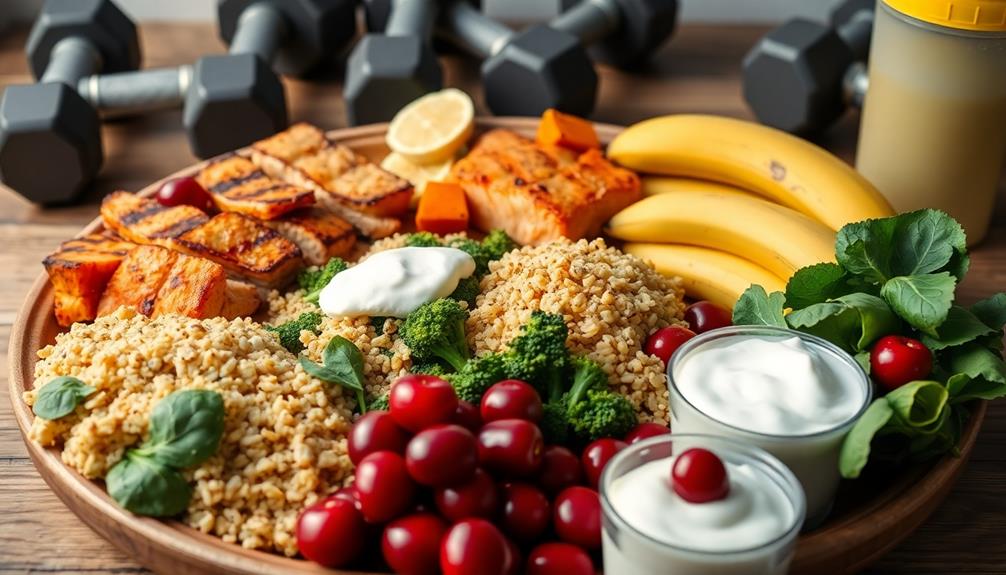After heavy lifting, focus on these five essential recovery strategies: First, cool down properly with light cardio and stretching. Second, fuel your muscles with a balanced meal containing protein, carbs, and healthy fats. Third, prioritize quality sleep, aiming for 7-9 hours nightly. Fourth, incorporate mobility exercises and stretching to maintain flexibility and reduce soreness. Finally, engage in active recovery methods like easy jogging or swimming to promote blood flow and healing. By implementing these techniques, you'll optimize your recovery, prevent injuries, and maximize your gains. Discover how each strategy can significantly influence your post-workout recovery process.
Core Insight
- Perform a proper cool-down with light cardio and stretching to gradually lower heart rate and prevent muscle stiffness.
- Consume a balanced meal with protein, carbs, and healthy fats within 2 hours post-workout to support muscle recovery.
- Prioritize quality sleep, aiming for 7-9 hours nightly, to allow your body to repair and rebuild muscle tissue.
- Incorporate mobility exercises and foam rolling to enhance flexibility and reduce muscle soreness.
- Engage in active recovery methods like light jogging or swimming on rest days to promote blood flow and healing.
Proper Cool-Down Techniques

Cool-down is a must after heavy lifting. It helps your body go from workout mode to rest mode. Start with 5-10 minutes of easy cardio, like walking or biking. This will slowly bring down your heart rate. Then, stretch the muscles you just worked out. Hold each stretch for 15-30 seconds and don't bounce. You can use cooling towels to help lower your body temperature and feel more comfortable.
Pay attention to your breathing as you cool down. Take deep breaths to help you relax. Use a foam roller or give yourself a massage to release tight muscles and improve flexibility. Last but not least, drink water. You need to replace the fluids you lost while working out. Following these cool-down steps will help you have less muscle soreness, avoid injury, and recover better.
Nutrition for Muscle Recovery

Eating the right foods is key for muscle recovery after a tough workout. Make sure to have a mix of protein, carbs, and healthy fats in your post-workout meal. Try to eat within 30 minutes to two hours after your session. Quick-digesting carb powders can help restore energy levels fast.
Protein helps repair and rebuild muscle. Go for lean meats, fish, eggs, or plant proteins like beans and tofu. Carbs refill your energy stores, so choose whole grains, sweet potatoes, or fruits. Remember to drink plenty of water to transport nutrients and keep your muscles working well. Add electrolytes if you sweat a lot. Lastly, eat foods that fight inflammation, such as berries, leafy greens, and fatty fish to support overall recovery.
Quality Sleep and Rest

Sleep is key for muscle recovery after heavy lifting. Your body fixes and builds muscle while you sleep, so make sure to get enough rest. Aim for 7-9 hours of sleep each night in a dark, quiet room. Some people find sleep aids helpful, but always check with your doctor first. Melatonin products can help you sleep better.
Tips for better sleep:
- Go to bed and wake up at the same times every day
- Keep your bedroom dark, cool, and quiet
- Don't use screens for an hour before bed
- Don't have too much caffeine or alcohol
- Do relaxing things before bed
Take rest days from working out too. They let your muscles fully recover and keep you from overtraining. On rest days, do light things like stretching or walking. This gets your blood moving and helps sore muscles feel better.
Mobility and Stretching Exercises

Stretching and mobility exercises are key for recovering after lifting weights. They help you become more flexible, feel less sore, and avoid getting hurt. Focus on stretching the main muscles you worked during lifting.
Foam rollers are great for deep massage and releasing tight muscles. They boost flexibility and muscle recovery.
Begin with dynamic stretches to warm up, then do static stretches. Hold stretches for 15-30 seconds and breathe deeply. Don't bounce. Really stretch tight areas like hip flexors, hamstrings, and shoulders.
Use a foam roller to release tension and improve blood flow. Roll each muscle for 30-60 seconds, especially on sore spots. Drink water while stretching to remove toxins and reduce stiffness.
Active Recovery Methods

Active recovery is crucial for bouncing back after lifting weights. It means doing easy exercises that get your blood pumping and help your muscles feel better. You'll want to do things that keep you moving without pushing your body too hard. Using a foam roller can make your active recovery even better by working on specific muscles and helping them relax.
Try these active recovery ideas:
- Jog or walk at a quick pace
- Swim or do exercises in the water
- Go for a relaxed bike ride
- Do some yoga or easy stretching
- Try dynamic bodyweight exercises
These activities help get rid of waste in your muscles and bring in fresh blood to fix them up. You'll notice that active recovery can really cut down on stiffness and help your body heal faster. Make sure to pay attention to how you feel and change how hard you're working if you need to. Just remember, the point is to help you recover, not to tire yourself out.
Frequently Asked Questions
How Long Should I Wait Before My Next Heavy Lifting Session?
You should wait at least 48-72 hours before your next heavy lifting session. This allows your muscles to recover and rebuild. Listen to your body; if you're still sore or fatigued, give yourself more time to rest.
Can Massage Therapy Aid in Muscle Recovery After Intense Weightlifting?
Yes, massage therapy can greatly aid your muscle recovery after intense weightlifting. It'll help reduce soreness, improve blood flow, and decrease muscle tension. You'll likely experience faster recovery times and improved flexibility with regular massages.
Are Ice Baths Effective for Reducing Post-Workout Muscle Soreness?
Yes, ice baths can be effective in reducing post-workout muscle soreness. You'll find they help decrease inflammation and constrict blood vessels. They're not for everyone, though, and you should consider your personal preferences and tolerance for cold.
What Role Do Supplements Play in Enhancing Recovery After Heavy Lifting?
Supplements can play a significant role in your recovery. You'll find protein powders help muscle repair, BCAAs reduce soreness, and creatine aids strength. Don't forget about multivitamins and omega-3s for overall health and inflammation reduction.
How Can I Prevent Overtraining While Maintaining a Consistent Weightlifting Routine?
To prevent overtraining, you should listen to your body, maintain adequate rest between workouts, vary your routine, and prioritize sleep. Don't skip rest days, and gradually increase intensity. Monitor your progress and adjust your program as needed.

